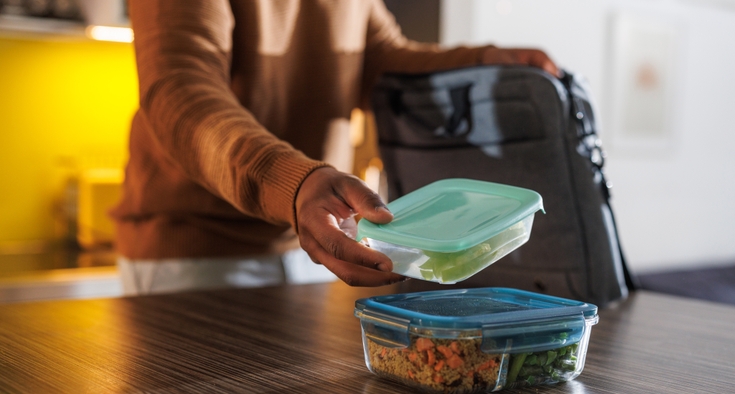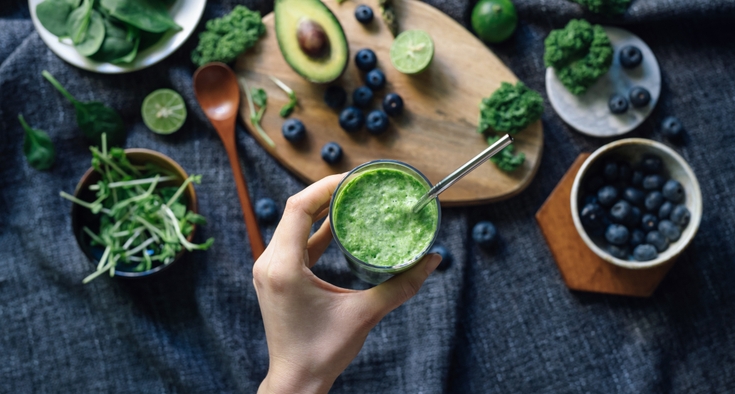
You may have heard that eggs are unhealthy because of their high cholesterol content. But actually, eggs are one of the most nutritious foods you can eat, said Kelly Homesley, a registered dietitian at Novant Health Bariatric Solutions - Elizabeth in Charlotte.
Here are more egg facts you might have “scrambled,” along with the truth.
We're here to help you achieve a healthy lifestyle.
The nutritional benefits of eggs
Eggs have lots of nutritional benefits and keep you full for a long time.
One egg offers a variety of vitamins and minerals, 6 grams of protein, and 5 grams of fat. Yes, 1.5 gram of that fat is saturated fat, a fat we are told to avoid. But the remaining fat is made up of monounsaturated and polyunsaturated fats, which reduce bad cholesterol levels in your blood and help your brain and cells function.
Because of the protein and fat, eggs have a high “satiety index.” This means they’ll keep you full longer, limit your cravings and mindless snacking, and help you consume fewer calories overall that day.
Eggs are also very low in carbohydrates, which means you can add extras like whole-wheat toast or sweet potatoes to round out your meal, or keep your plate lower-carbohydrate depending on your goals.
Eggs are healthier than many other protein sources.
Eggs offer protein, healthy fats, and vitamins and minerals without bringing additional carbohydrates or much unhealthy fat. This sets it apart from many other protein sources. For example, a piece of bacon is high in protein but also high in saturated fat, and it has no vitamins and minerals. If you're trying to fill up your plate with nutritious foods, an egg definitely earns its place.
Eggs are high in cholesterol, but dietary cholesterol is different than blood cholesterol.
Yes, egg yolks contain cholesterol – but cholesterol consumed through your diet probably doesn’t raise your risk of heart disease.
Scientists used to believe that the dietary cholesterol in foods like butter, full-fat dairy, high-fat meat and eggs led to higher blood cholesterol, and recommended limiting dietary cholesterol. Now, scientists believe that high blood cholesterol is likely due to the saturated fats in those foods, in addition to inactivity, smoking, obesity, Type 2 diabetes, genetics, ethnicity and aging.
Instead of avoiding dietary cholesterol all together, now the American Heart Association says that healthy people can safely eat one egg a day, or two eggs a day if they’re older and don’t have high blood cholesterol, or more eggs than this if they’re vegetarian. That’s 7 to 14 eggs a week, worry-free.
If you're still uneasy or have high LDL cholesterol, consider minimizing your consumption of yolks: for example, scramble one whole egg with additional egg whites, or use only the egg whites. But don’t discount eggs all together, unless you just don't like them.
Your cooking method matters.
Whether you cook it yourself or get it from a restaurant, if you order your eggs runny, over-easy, poached, soft-boiled, or sunny-side up, you're risking salmonella every time. The Centers for Disease Control and Prevention estimates that 1 in 20,000 eggs is contaminated with salmonella.
To avoid salmonella, cook your eggs fully. Safe cooking methods include boiling, scrambling, and pan frying them.
Your cooking method also sets the tone for the final nutrition breakdown of your meal. If you’re using butter, bacon grease or vegetable oil, these are all high in saturated fat — so even though the eggs are healthy, you haven’t made a heart-healthy meal.
In contrast, using a nonstick pan or a light coating of cooking spray won't add extra fat or calories. Or use a small amount of a heart-healthy fat like olive oil or avocado oil. Homesley offers this hack: If a small drop of oil on the pan isn't spreading well, use a paper towel to spread the oil evenly across the pan.
There isn't a “healthiest” style of egg preparation, as long as you are cooking the eggs to 165 degrees with minimal added fat. However, omelets and scrambled eggs give you a good opportunity to add a vegetable to your breakfast – throw in a few handfuls of spinach or sauté some mushrooms and/or peppers in light olive oil. You can also add a little cheese or cottage cheese for extra protein and calcium.
The “cheaper” eggs are just fine.
We know — currently, there are no cheap eggs, thanks in part to bird flu. But if you're wondering about the pricier eggs on the shelf, here’s a quick rundown:
- Heirloom eggs come from unique hen breeds and have a pretty color. If you’re trying to impress someone with a fancy meal, sure, buy these eggs. Otherwise, they are not nutritionally very different from normal eggs.
- Free-range eggs come from chickens with some level of access to the outdoors. These chickens may have a slightly more varied diet than conventionally raised chickens, but this isn’t a guarantee. The evidence does not find that free-range eggs are significantly more nutritious than conventional eggs.
- Organic eggs come from chickens who are fed an organic diet. If avoiding pesticides is important to you, you may want to prioritize these eggs. Some studies show they may be slightly more nutritious than conventional eggs.
- Omega-3 eggs come from chickens that are fed a special diet including fish oils, flaxseed, and/or algae to boost the omega-3 fatty acid content. In Homesley’s opinion, you're better off taking a supplement if you want to boost your consumption of this particular fat, because you'd have to eat a lot of eggs to get the same benefit of a supplement.
3 egg recipes
Healthy egg salad
Recipe adapted from feelgoodfoodie.net. Serves 4.
This egg salad is made with plain Greek yogurt instead of mayonnaise to boost protein and cut saturated fat. It's great for meal prep!
Ingredients:
6 hard-boiled eggs, peeled and roughly chopped
1 tablespoon chopped parsley
3 celery stalks, chopped
1/4 teaspoon black pepper
1/2 teaspoon salt
1/2 teaspoon lemon zest
2 teaspoons Dijon mustard
1/3 cup nonfat plain Greek yogurt
Preparation:
Chop the hardboiled eggs; set aside.
Whisk together the Greek yogurt, Dijon mustard, lemon zest, salt, and pepper in a large bowl.
Add the chopped eggs, celery, and parsley, and stir to combine.
We recommend serving it on whole wheat bread, with a wrap, with carrots and celery, or with higher-fiber, wheat-based crackers such as Triscuits, Wheat Thins or Wasa crackers.
Yields: 4 servings. Per serving: 135 calories; 8.2 g fat; 280.2 mg cholesterol; 483.7 mg sodium; 2.7 g carbohydrate; 1.9 g sugar; 11.7 g protein
Shakshuka
Recipe adapted from thekitchn.com. Serves 4 to 6.
Wow your brunch or dinner guests with this meal. It features fresh and canned produce, protein-rich eggs, and leaves just one pan (and one cutting board) to clean up. Add ground turkey to make it a heartier, more protein-heavy meal, or leave it out and keep it vegetarian.
Ingredients:
1 medium yellow onion, diced
1/2 teaspoon freshly ground black pepper
1 teaspoon kosher salt, plus more as needed
1 teaspoon paprika
1 teaspoon ground cumin
1/2 medium lemon
1/4 cup water
1 (about 14-ounce) can crushed tomatoes or tomato pulp (1 3/4 cups)
2 tablespoons tomato paste
2 tablespoons olive oil
2 cloves garlic, chopped
1 medium bell pepper, diced
6 large eggs
Whole-wheat pita or crusty whole-wheat bread, for serving (optional)
8 oz ground turkey (optional)
1/4 cup crumbled feta cheese (about 2 ounces)
2 to 4 tablespoons coarsely chopped fresh cilantro or parsley leaves, or a combination
Preparation:
Heat olive oil in a large, deep skillet over medium heat until shimmering. Add the onion and bell pepper and cook, stirring occasionally, until the onion is translucent and the pepper is softened, 6 to 8 minutes. Add the ground turkey, if using, and cook until it begins to brown. Add the garlic and 2 tablespoons tomato paste. Cook, stirring occasionally, until the tomato paste slightly darkens in color.
Add 1 (about 14-ounce) can crushed tomatoes. Add 1/4 cup water to the now-empty can, swirl to loosen any remaining bits of tomato, and pour into the skillet. Juice 1/2 medium lemon into the skillet. Add 1 teaspoon ground cumin, 1 teaspoon paprika, 1 teaspoon kosher salt, and 1/2 teaspoon black pepper. Stir until combined and simmer until the sauce is thickened slightly and darkened in color, about 10 minutes.
With the back of a large spoon, make 6 wells in the sauce, spacing them evenly apart. Crack 1 large egg into each well (remake the wells as needed if they lose their shape). Season each egg lightly with kosher salt. Cover and cook until eggs are fully cooked to avoid risk of salmonella. (If using ground turkey, make sure it is cooked to 165 degrees prior to serving.)
Garnish with 2 to 4 tablespoons coarsely chopped fresh cilantro or parsley and 1/4 cup crumbled feta cheese. Serve with fresh pita or crusty bread if desired.
Yields: 4 to 6 servings. Per serving, assuming 4 servings: 240 calories; 16.3 g fat; 283.7 mg cholesterol; 881.8 mg sodium; 13.5 g carbohydrate; 7.2 g sugar; 12.6 g protein
With optional ground turkey, using 7% fat/93% lean turkey: 361 calories; 22.8 g fat; 342.7 mg cholesterol; 932.1 mg sodium; 13.5 g carbohydrate; 7.2 g sugar; 27.9 g protein
*Nutrition facts will change if you add bread or pita.
One-Serving Easy Air-Fryer Omelet
Recipe adapted from whollytasteful.com. Serves 1.
You'll make this one-person, easy-cleanup omelet in a silicone tray that fits inside your air fryer.
Ingredients:
2 large eggs
1/4 teaspoon black pepper ground
1/4 teaspoon salt
4 cherry tomatoes, sliced
3 tablespoons grated cheddar cheese
1/2 cup baby spinach chopped, packed
1/2 bell pepper, any color, chopped
1 green onion, chopped
1 ounce ham (1 thin slice), chopped small
2 tablespoons fat-free milk
Preparation:
Spray an 8-inch silicone tray with cooking spray.
In a mixing bowl or glass measuring cup, whisk together eggs and a splash of milk (or water). Whisk vigorously with a fork until frothy. This will introduce air into the mixture, making your omelet fluffy.
Add chopped ham, bell pepper, green onion, chopped spinach and grated cheese to the beaten eggs. Season with salt and pepper, and mix well.
Transfer the egg mixture to the prepared silicone tray. Even out with a fork if needed. Top with sliced cherry tomatoes.
Preheat the air fryer to 340°F. Take the basket out completely, carefully place the silicone tray inside, place the basket back in the air fryer, and air fry for 9-12 minutes.
Check the omelet after 9 minutes. Lift the edge gently to ensure it's set. If it's still undercooked or if you see any liquid, air fry for 2-3 minutes longer until fully set.
Remove the silicone tray from the air fryer and place it on a plate or heat-proof surface. Gently lift the omelet with a spatula and slide it onto a plate, being careful not to break it.
Serve hot on its own or with your favorite breakfast sides.
Yields: 1 serving. Per serving: 398 calories; 25.8 g fat; 428.2 mg cholesterol; 1422.3 mg sodium; 11.7.3 g carbohydrate; 7.3 g sugar; 30.3 g protein












